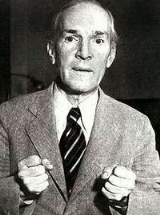
Upton Beall Sinclair Jr. (September 20, 1878 – November 25, 1968), was an American
author who wrote close to one hundred books in many genres. He achieved popularity in the first half of the twentieth century, acquiring particular fame for his classic muckraking
novel, The Jungle
(1906). It exposed conditions in the U.S. meat packing industry
, causing a public uproar that contributed in part to the passage a few months later of the 1906 Pure Food and Drug Act
and the Meat Inspection Act
.
What life means to me is to put the content of Shelley into the form of Zola. The proletarian writer is a writer with a purpose; he thinks no more of "art for art's sake" than a man on a sinking ship thinks of painting a beautiful picture in the cabin; he thinks of getting ashore — and then there will be time enough for art.![]()
Let us redeem our great words from base uses. Let that no longer call itself Love, which knows that it is not free!![]()
I know you are brave and unselfish people, making sacrifices for a great principle but I cannot join you. I believe in the present effort which the allies are making to suppress German militarism. I would approve of America going to their assistance. I would enlist to that end, if ever there be a situation where I believe I could do more with my hands than I could with my pen.![]()
All art is propaganda. It is universally and inescapably propaganda; sometimes unconsciously, but often deliberately, propaganda.![]()
I used to say to our audiences: "It is difficult to get a man to understand something, when his salary depends upon his not understanding it!"![]()

